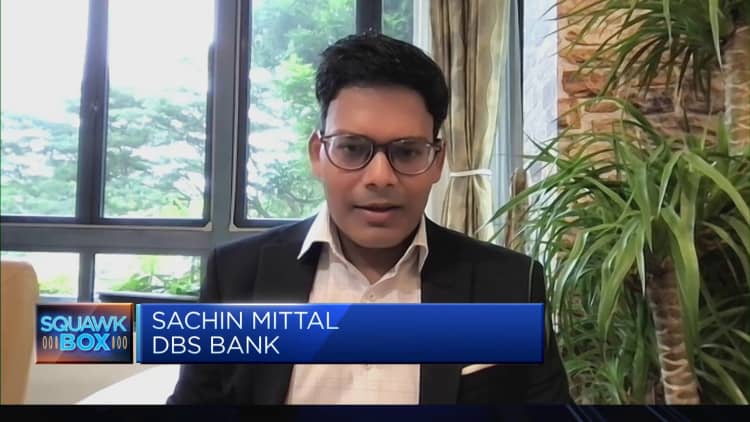Customers dining at Boat Quay in the Central Business District of Singapore.
Bryan van der Beek | Bloomberg | Getty Images
SINGAPORE — Singapore-based food delivery apps Grab and Foodpanda are expanding into the dine-in space, as consumers look to eat out more post-pandemic.
Grab is testing its dine-in feature across 15 cities in Singapore, Thailand and Indonesia, allowing users to pre-purchase dine-in vouchers at up to 50% discounts. App users can also view restaurants’ menus and reviews, order and pay via a QR-based system, as well as book rides to restaurants.
related investing news
The company told CNBC it has plans to launch in Malaysia, the Philippines and Vietnam as well.
Foodpanda was the first food delivery companies in Singapore to introduce dine-in features in 2021.
Foodpanda Dine-in is currently available in Singapore, Thailand, the Philippines, Malaysia, Hong Kong, Pakistan and Bangladesh. Since 2022, over 8,000 restaurants across these countries have started offering dine-in discounts ranging from 15% to 25%.
“We triggered the discussion already during the pandemic. And of course, we knew back then already, that there will be life after [the pandemic],” said Jakob Sebastian Angele, Asia Pacific CEO at Foodpanda, at a media briefing last week.
With dining out costs increasing with higher inflation, consumers are also looking for deals to save costs wherever they can, and there’s almost no better feeling than having a good meal at a discount.
Jonathan Woo
Senior analyst, Phillip Securities Research
Angele said the company sees “a huge potential in dine-in” and it can become “very, very sizable” for Foodpanda. Food delivery is currently still Foodpanda’s largest business, followed by grocery delivery, he said.
Last week, Foodpanda announced a collaboration with Singapore-based restaurant solutions provider TabSquare to automate food ordering processes through digital menus, QR ordering and more. TabSquare was fully acquired by Foodpanda’s parent company Delivery Hero in 2021.
In June, food delivery service AirAsia Food launched dine-in services in collaboration with restaurant reservation platform eatigo. In Thailand, it even offers a queuing service which allows users to book riders to queue up for them at restaurants.

Tay Chuen Jein, head of deliveries for Singapore at Grab, said at the time when the firm launched GrabFood’s Dine-in service that offering these discounts “makes eating out more affordable.”
“It not only helps our users discover restaurants to go to, but also makes eating out more affordable as several merchant-partners are offering attractive dine-in vouchers that can be purchased through the app,” Tay said in a press release.
Jonathan Woo, a senior analyst at Phillip Securities Research, said that with dining out costs increasing with higher inflation, “consumers are also looking for deals to save costs wherever they can, and there’s almost no better feeling than having a good meal at a discount.”
He said Grab can “indirectly generate incremental revenue from dine-in services.” In this instance, revenues are derived from commission fees for each dine-in voucher purchase.
“Increasing monetization from existing users is significantly more cost effective, while also raising awareness for F&B merchants,” said Woo.
Food delivery apps want to help [restaurants] get some business in terms of dining in and booking. So I think it’s a very natural thing to do.
Sachin Mittal
Head of telecom, media and internet sector research, DBS Bank
Investment banking firm Benchmark Company said in an April report that food delivery experienced stellar growth in the past three years.
But the report added that a 50% compound annual growth rate “has been showing signs of moderating growth lately as consumers resume their normal daily routines and go out and dine in more frequently.”
“With reduced incentives as high growth companies prioritize cash preservation, we anticipate that consumers may order less frequently, and merchants will likely shift their efforts towards dine-in, which could further slow on-demand order volume growth near term,” said the analysts at Benchmark Company.
Benchmark added that it expected “normalized food delivery growth going forward with a CAGR of 13% through 2025.” CAGR is a measure of annualized returns for an investment over a period of time, with the assumption that profits are reinvested at the end of each year.
Grab’s CFO Peter Oey said during the firm’s first-quarter earnings call in May that the company expects deliveries to recover in the second quarter. Deliveries gross merchandize volume in the first quarter was about 9% lower than a year ago.
“Notably, deliveries transactions have rebound strongly in the back end of April, following the Ramadan fasting period, and this has been sustained into the early parts of the month of May,” said Oey.
Chinese tech giants such as Alibaba and ByteDance provide so-called local life services, including food delivery, in-store dining, travel booking and group buying. Chinese food delivery giant Meituan offers in-store dining services which include dine-in vouchers.
Sachin Mittal, head of telecom, media and internet sector research at DBS Bank, told CNBC this was a “standard template which everyone does.”
“Food delivery apps want to help [restaurants] get some business in terms of dining in and booking. So I think it’s a very natural thing to do,” said Mittal.
“Whether it’s because of Covid or not, it has to be done like this because there’s no delivery charges involved in this so this increases the [profit] margin,” said Mittal.
